- 408-924-7560
- mineta-institute@sjsu.edu
- Donate
Past Webinars
MTI organizes or participates in several transportation-related webinars each year. You can find leading transportation experts at all of these webinars, making them an excellent resource for professional and research insights.
| Dates | Events |
|---|---|
June 11, 2021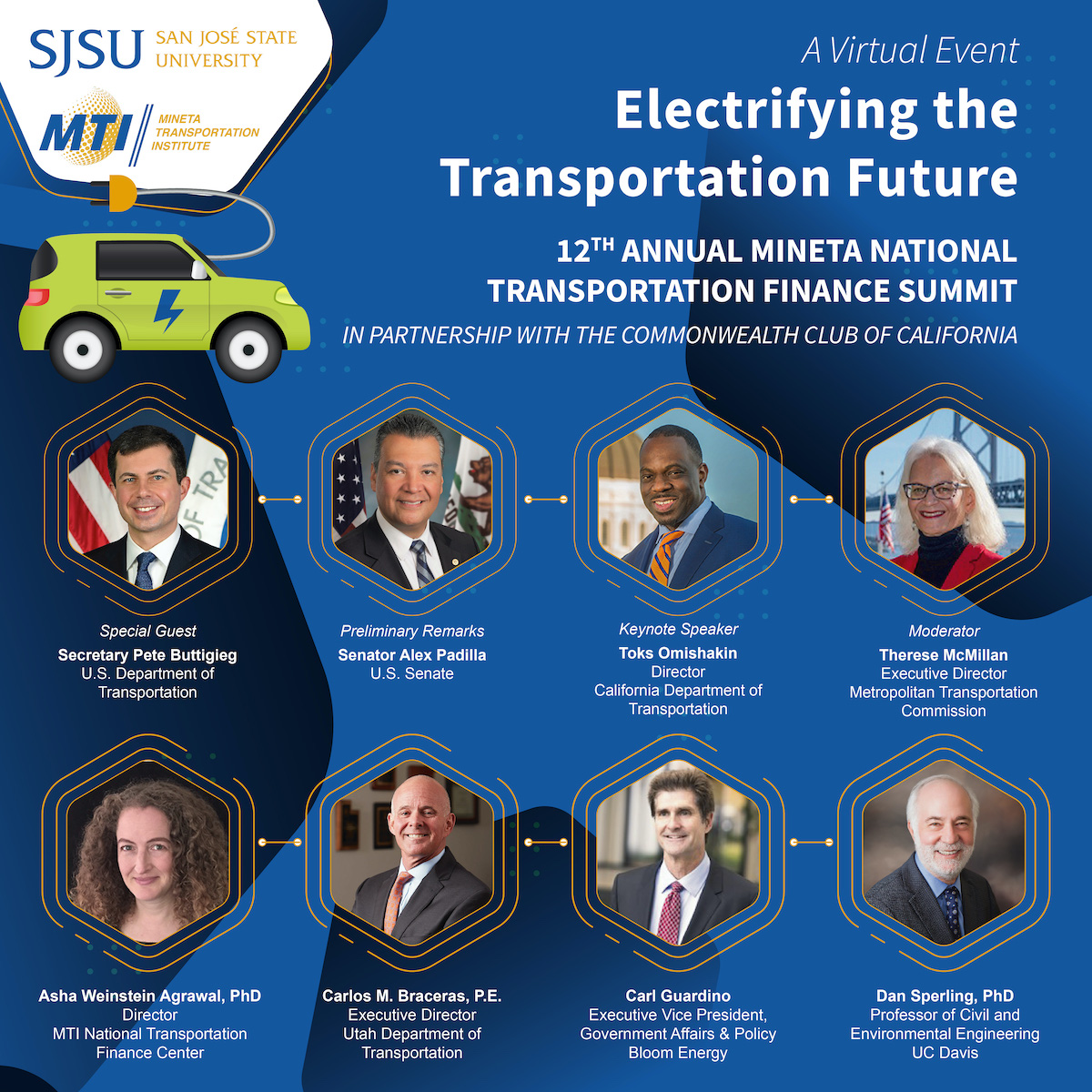 |
12th Annual Mineta National Transportation Policy Summit presents 'Electrifying the Transportation Future' Transportation policymakers face two overlapping, once-in-a-generation opportunities: electrifying the nation’s vehicle fleet and re-establishing a stable source of federal and state revenue for transportation. As states and the Biden administration begin a push to rapidly electrify the US fleet for climate reasons, policymakers are under increasing pressure to rethink how states and the federal government fund transportation infrastructure and services. For decades, motor fuel taxes have generated the majority of state and federal funds spent on transportation, even if recently these taxes have been losing their purchasing power. However, a shift to electric vehicles will require a new transportation funding model. The speakers will discuss the challenges and opportunities with such options as mileage fees, carbon taxes, higher vehicle registration fees, or a shift entirely away from user-generated revenue. View Recording | View Program | View Flyer | View event page on Commonwealth Club website | View past MTI's National Transportation Policy Summits |
May 18, 2021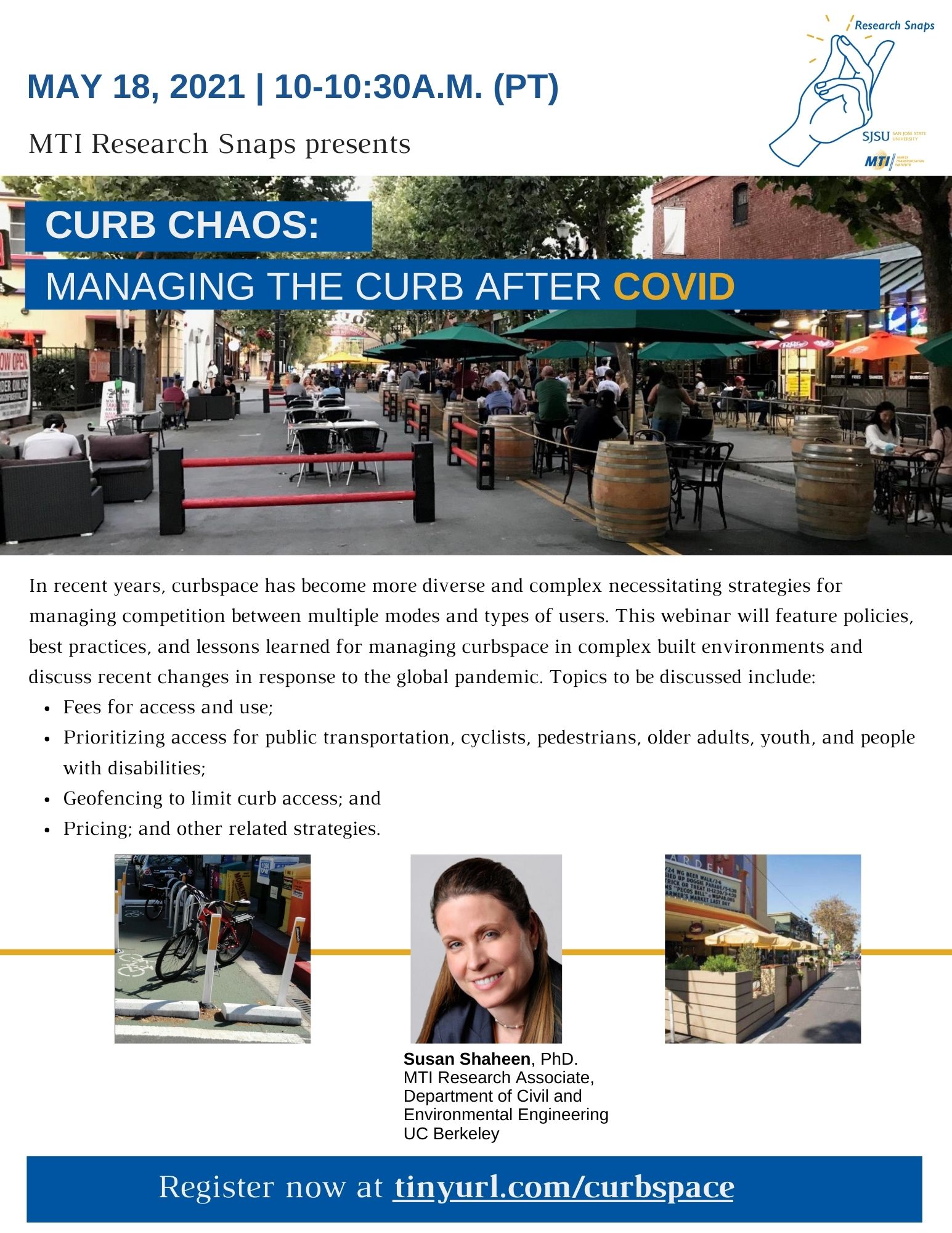 |
MTI Research Snaps Webinar: "Curb Chaos: Managing the Curb After COVID" - Online In recent years, curbspace has become more diverse and complex necessitating strategies for managing competition between multiple modes and types of users. This webinar featured policies, best practices, and lessons learned for managing curbspace in complex built environments and discussed recent changes in response to the global pandemic. Topics discussed include:
View Recording.View Slides. |
April 22, 2021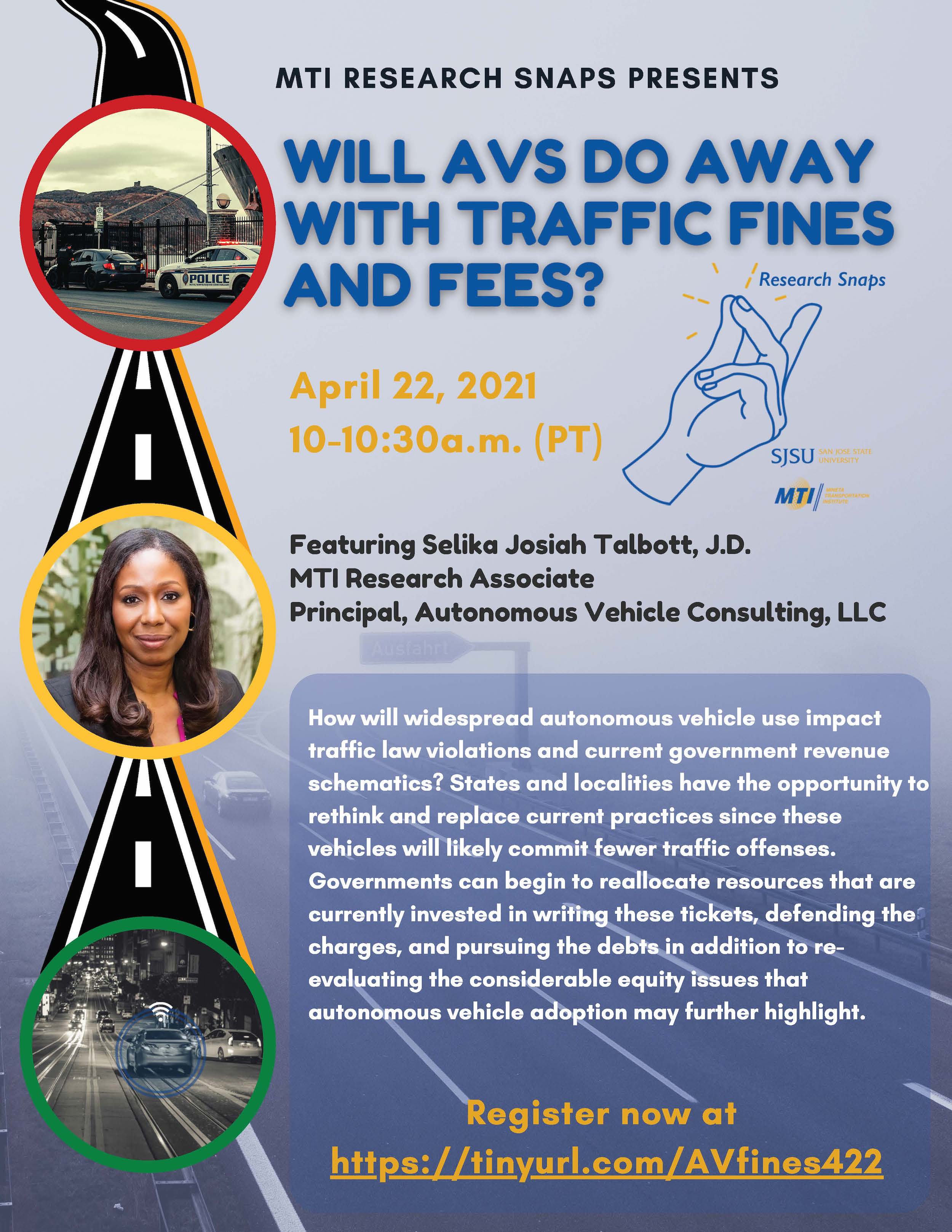 |
MTI Research Snaps Webinar: "Will AVs Do Away with Traffic Fines and Fees?" - Online This webinar discussed how widespread autonomous vehicle use impact traffic law violations and current government revenue schematics. States and localities have the opportunity to rethink and replace current practices since these vehicles will likely commit fewer traffic offenses. Governments can begin to reallocate resources that are currently invested in writing these tickets, defending the charges, and pursuing the debts in addition to re-evaluating the considerable equity issues that autonomous vehicle adoption may further highlight. View Recording.View Slides. |
March 18, 2021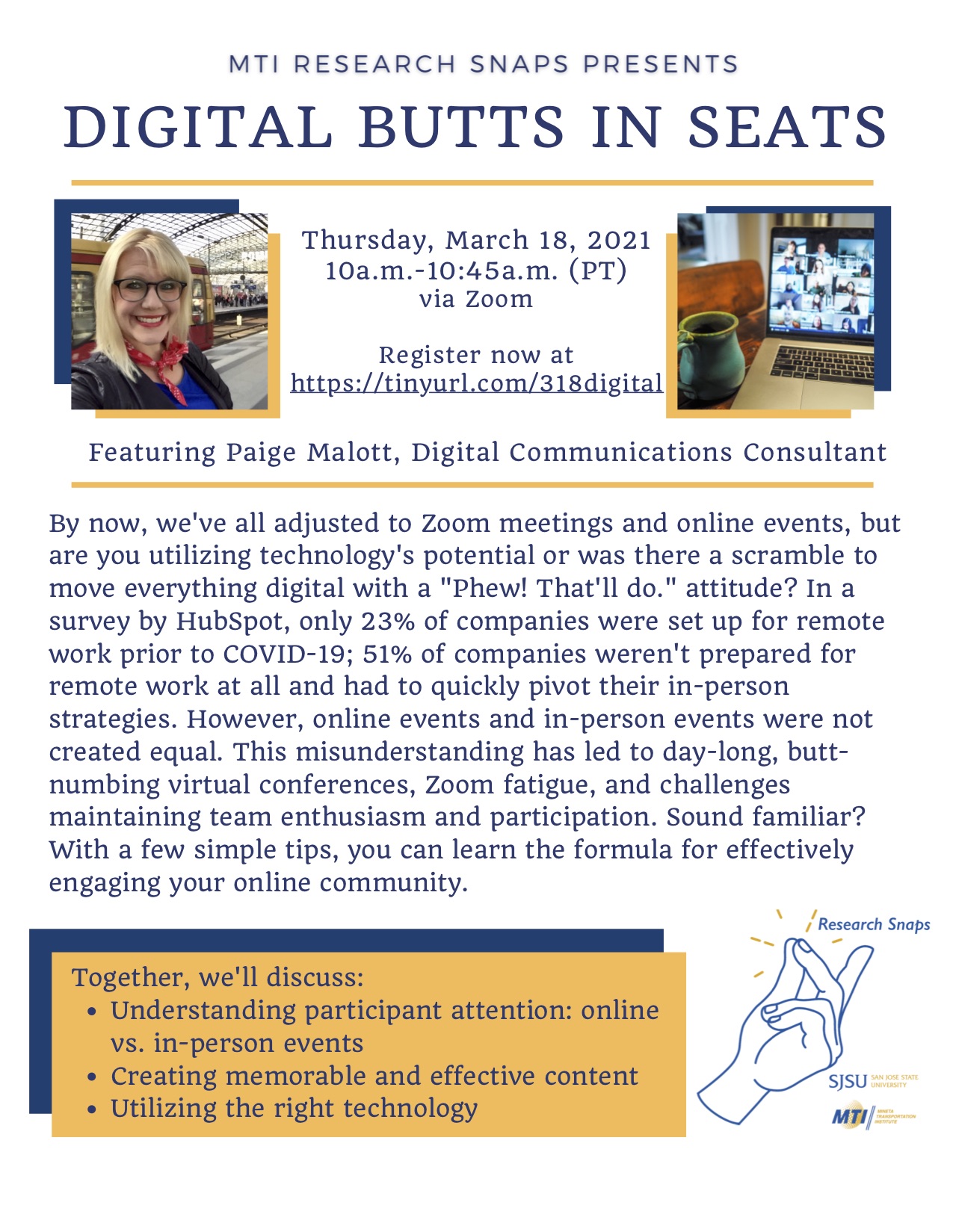 |
MTI Research Snaps Webinar: "Digital Butts in Seats: Creating Interesting, Engaging Virtual Events" - Online By now, we've all adjusted to Zoom meetings and online events, but are you utilizing technology's potential or was there a scramble to move everything digital with a "Phew! That'll do." attitude? In a survey by HubSpot, only 23% of companies were set up for remote work prior to COVID-19; 51% of companies weren't prepared for remote work at all and had to quickly pivot their in-person strategies. However, online events and in-person events were not created equal. This misunderstanding has led to day-long, butt-numbing virtual conferences, Zoom fatigue, and challenges maintaining team enthusiasm and participation. Sound familiar? With a few simple tips, you can learn the formula for effectively engaging your online community. Webinar discussed:
View Recording. |
March 4, 2021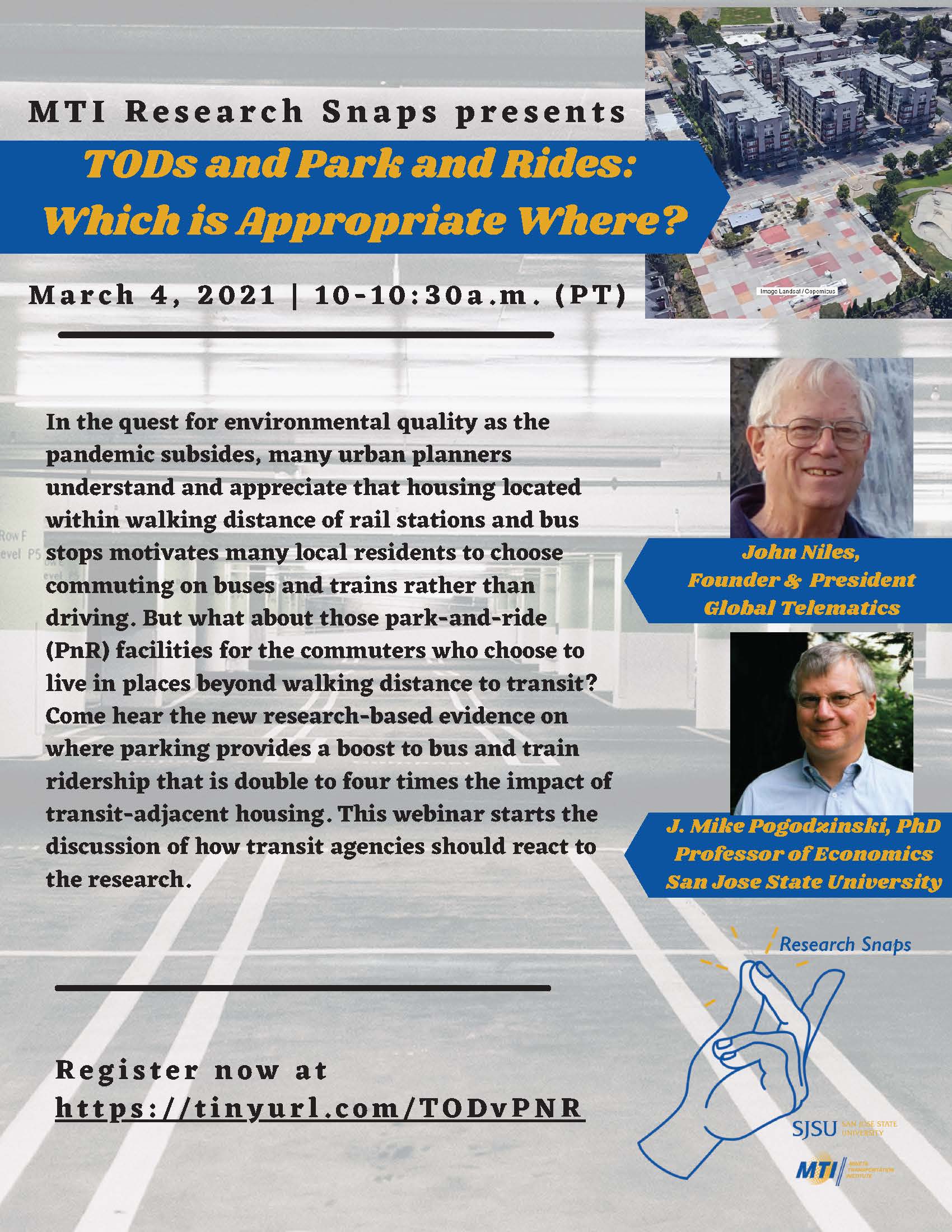 |
MTI Research Snaps Webinar: "TODs and Park and Rides, Which is Appropriate Where?" - Online In the quest for environmental quality as the pandemic subsides, many urban planners understand and appreciate that housing located within walking distance of rail stations and bus stops motivates many local residents to choose commuting on buses and trains rather than driving. But what about those park-and-ride (PnR) facilities for the commuters who choose to live in places beyond walking distance to transit? Attendees listened to the new research-based evidence on where parking provides a boost to bus and train ridership that is double to four times the impact of transit-adjacent housing. This webinar started the discussion of how transit agencies should react to the research. View Recording.View Slides. |
February 16, 2021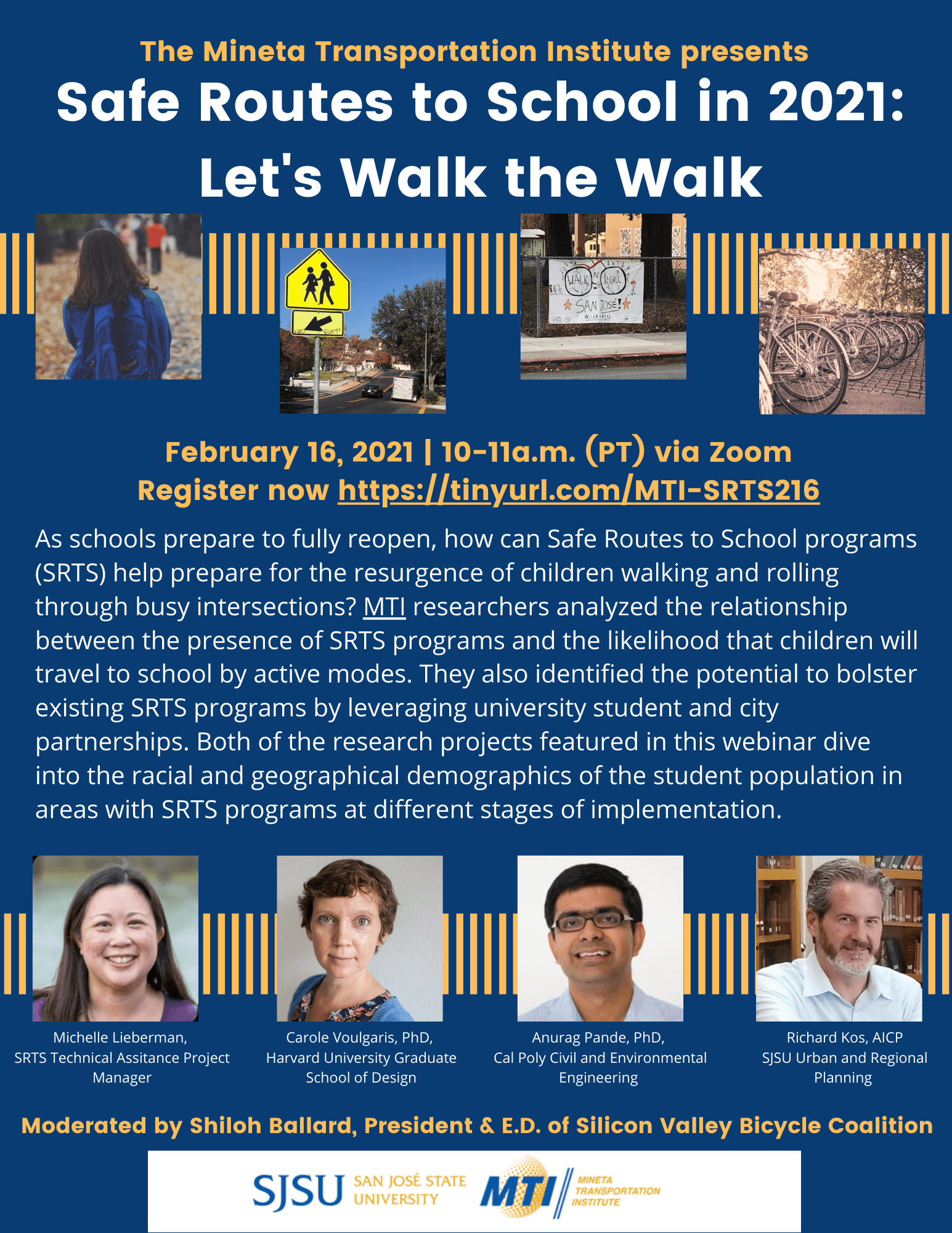 |
Safe Routes to School in 2021: Let’s Walk the Walk - Online As schools prepare to fully reopen, how can Safe Routes to School programs (SRTS) help prepare for the resurgence of children walking and rolling through busy intersections? MTI researchers analyzed the relationship between the presence of SRTS programs and the likelihood that children will travel to school by active modes. They also identified the potential to bolster existing SRTS programs by leveraging university student and city partnerships. Both of the research projects featured in this webinar dive into the racial and geographical demographics of the student population in areas with SRTS programs at different stages of implementation. View Recording.View Slides. |
January 14, 2021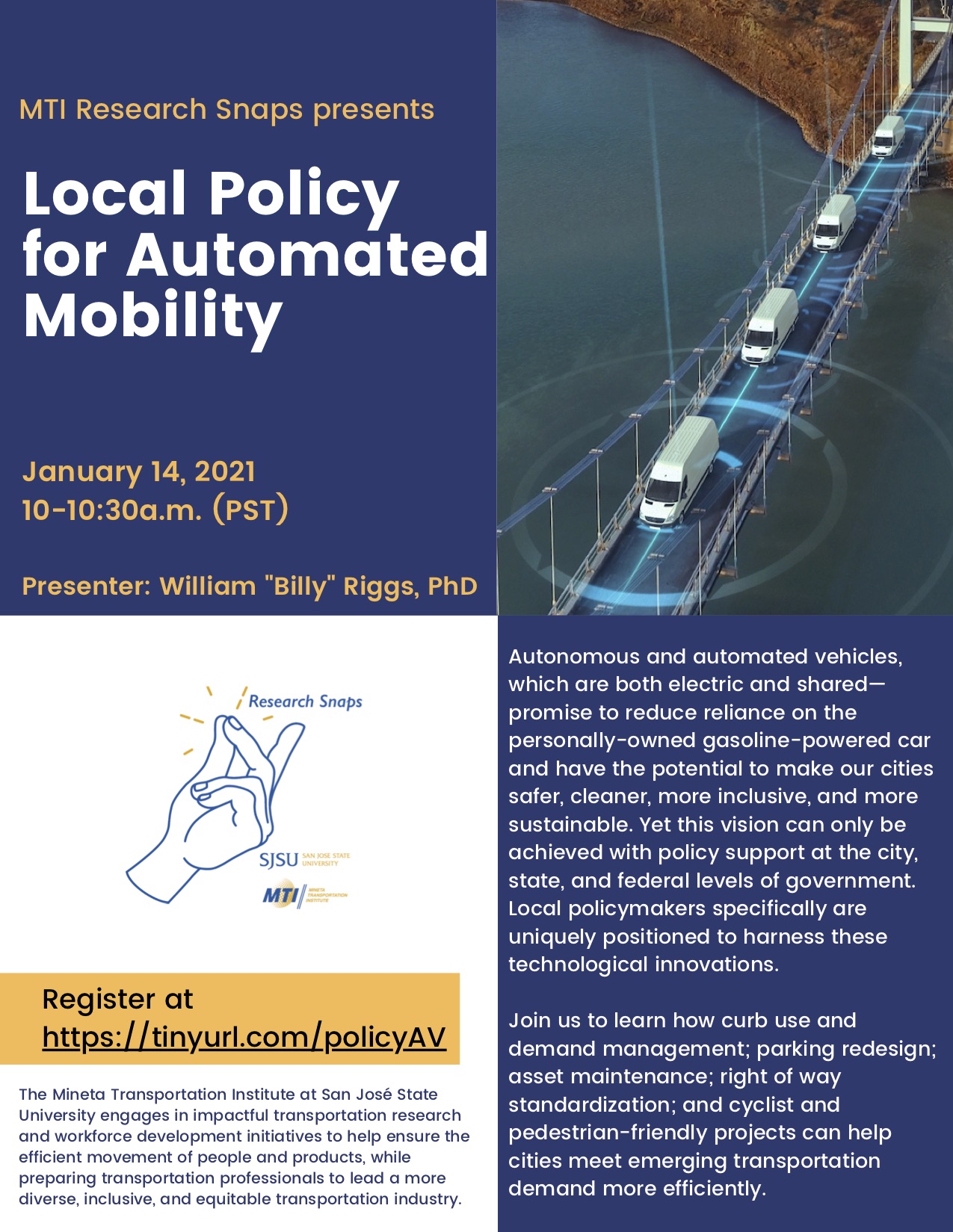 |
MTI Research Snaps Webinar: "Local Policy for Automated Mobility" - Online Autonomous and automated vehicles, which are both electric and shared—promise to reduce reliance on the personally-owned gasoline-powered car and have the potential to make our cities safer, cleaner, more inclusive, and more sustainable. Yet this vision can only be achieved with policy support at the city, state, and federal levels of government. Local policymakers specifically are uniquely positioned to harness these technological innovations. Attendees learned how curb use and demand management; parking redesign; asset maintenance; right of way standardization; and cyclist and pedestrian-friendly projects can help cities meet emerging transportation demand more efficiently. View Recording.View Slides. |
December 9, 2020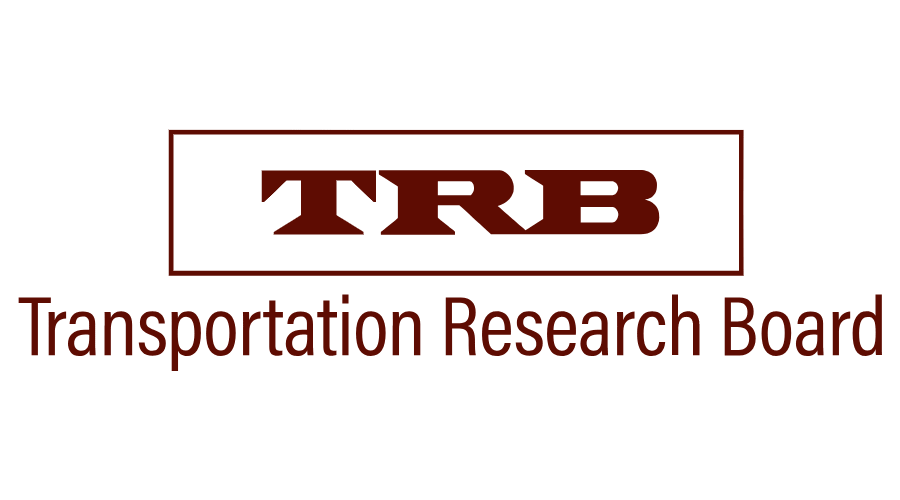 |
Navigating TRB 2021: Getting the Most Out of the Conference - Online CSU students participated in an informal information session with Drs. Asha W. Agrawal and Hilary Nixon to learn how to make the most of their TRB experience. |
December 9, 2020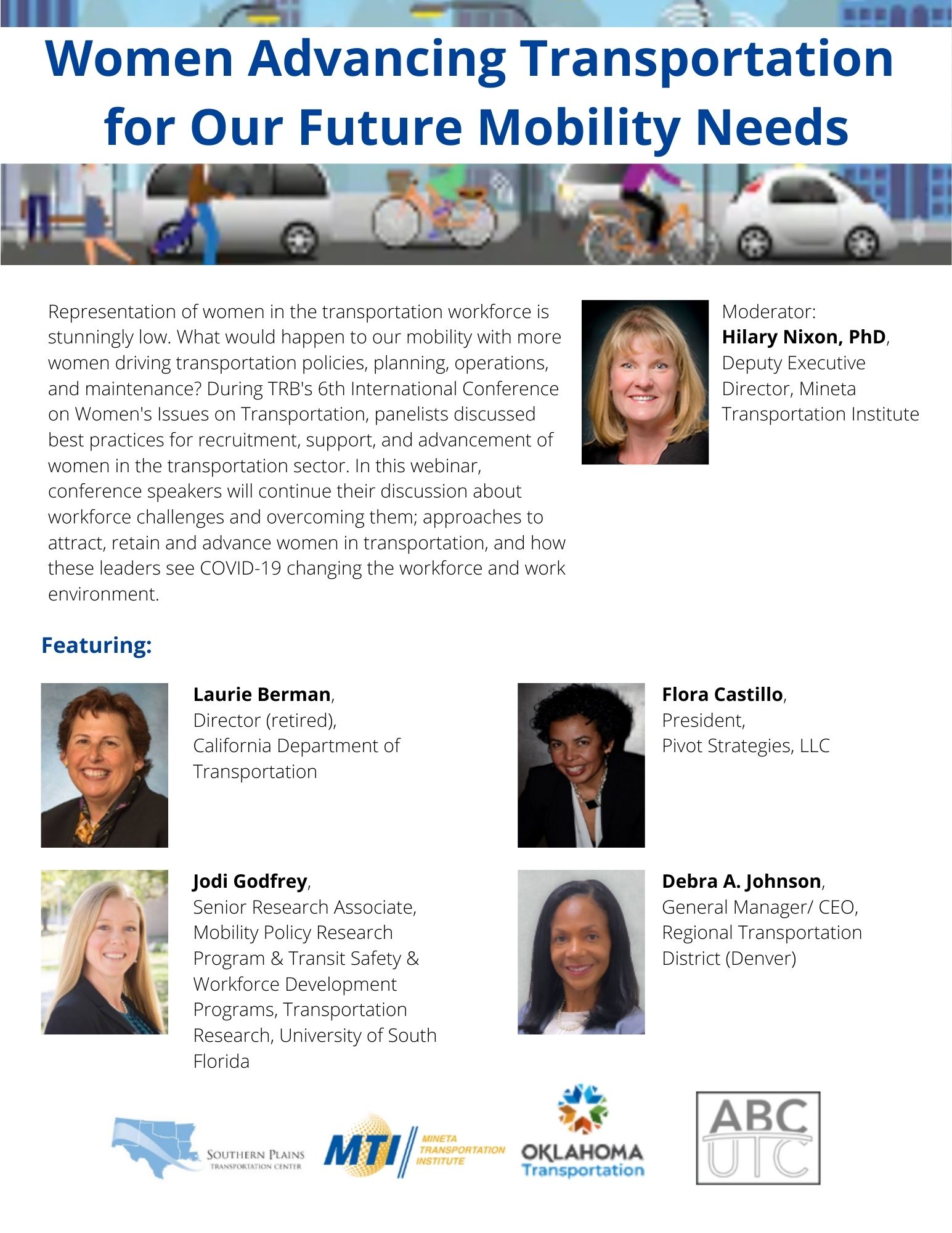 |
Women Advancing Transportation for Our Future Mobility Needs Representation of women in the transportation workforce is stunningly low. What would happen to our mobility with more women driving transportation policies, planning, operations, and maintenance? During TRB's 6th International Conference on Women's Issues on Transportation, panelists discussed best practices for recruitment, support, and advancement of women in the transportation sector. In this webinar, conference speakers continued their discussion about workforce challenges and overcoming them; approaches to attract, retain and advance women in transportation, and how these leaders see COVID-19 changing the workforce and work environment. Featuring:
|
December 3, 2020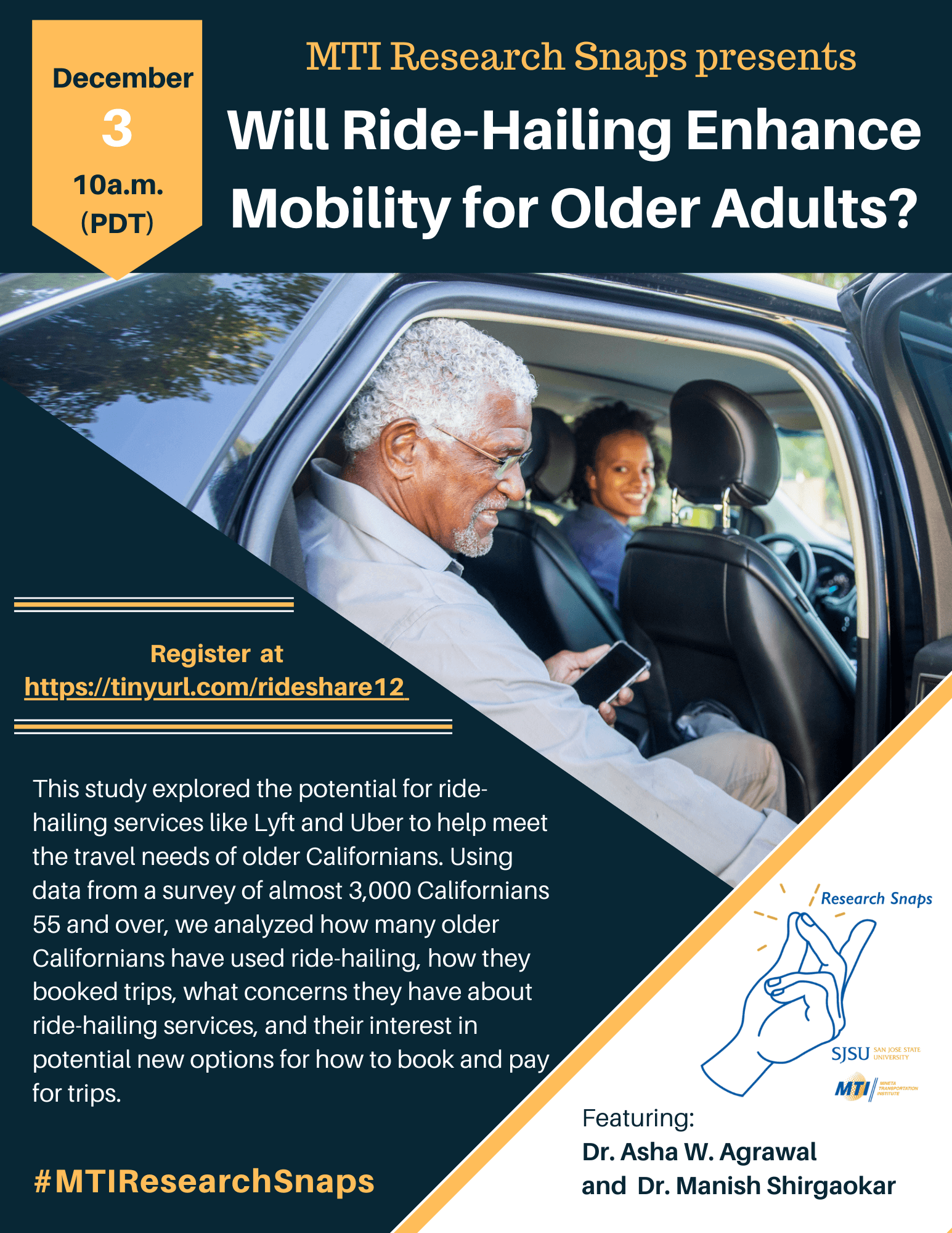 |
MTI Research Snaps Webinar: "Will Ride-hailing Enhance Mobility for Older Adults?" - San José, CA This webinar discussed the explored potential for ride-hailing services like Lyft and Uber to help meet the travel needs of older Californians. Using data from a survey of almost 3,000 Californians 55 and over, researchers analyzed how many older Californians have used ride-hailing, how they booked trips, what concerns they have about ride-hailing services, and their interest in potential new options for how to book and pay for trips. View Recording.View Slides. |
November 18, 2020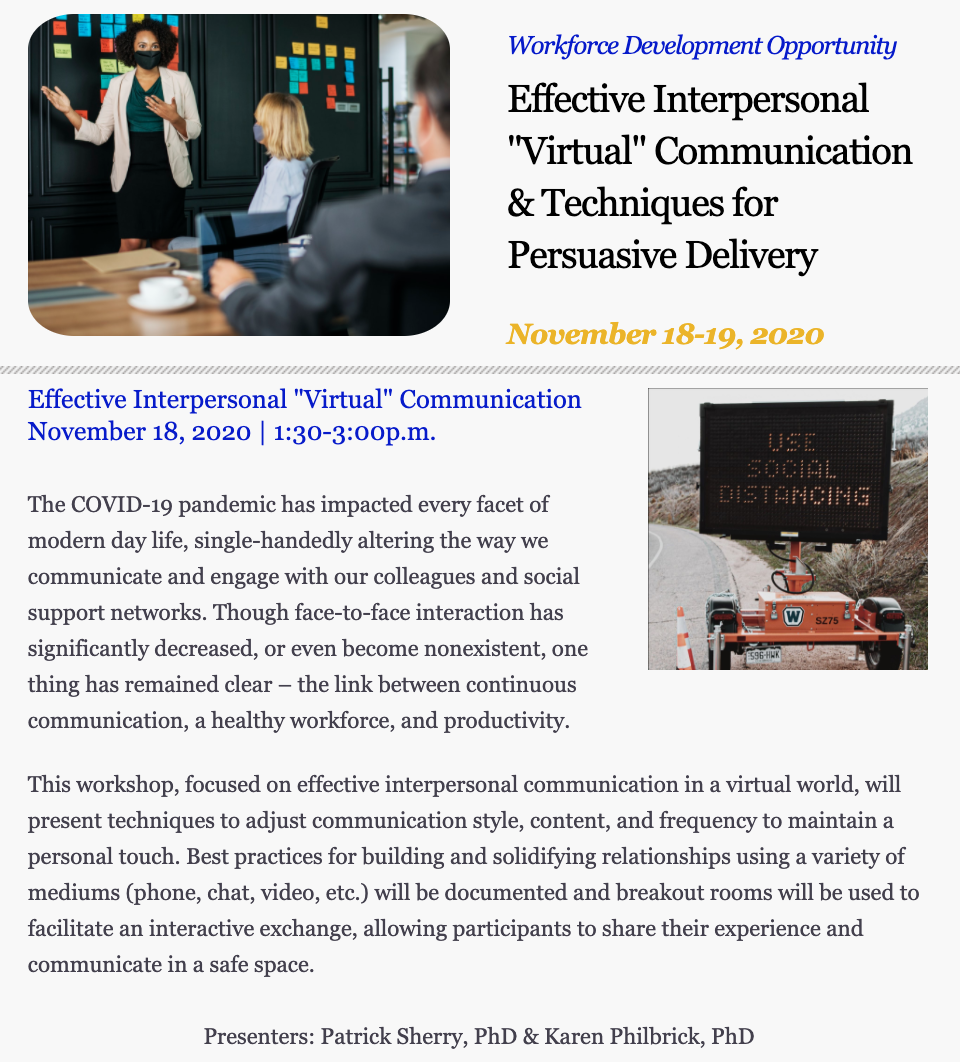 |
Effective Interpersonal "Virtual" Communications - Online The COVID-19 pandemic has impacted every facet of modern day life, single-handedly altering the way we communicate and engage with our colleagues and social support networks. Though face-to-face interaction has significantly decreased, or even become nonexistent, one thing has remained clear – the link between continuous communication, a healthy workforce, and productivity. This workshop, focused on effective interpersonal communication in a virtual world, presented techniques to adjust communication style, content, and frequency to maintain a personal touch. Best practices for building and solidifying relationships using a variety of mediums (phone, chat, video, etc.) was documented and breakout rooms will be used to facilitate an interactive exchange, allowing participants to share their experience and communicate in a safe space. *This webinar was intended for our partners at Caltrans (all Caltrans employees welcome), but if you or your organization is interested in hosting a similar event, please contact irma.garcia@sjsu.edu. |
November 4, 2020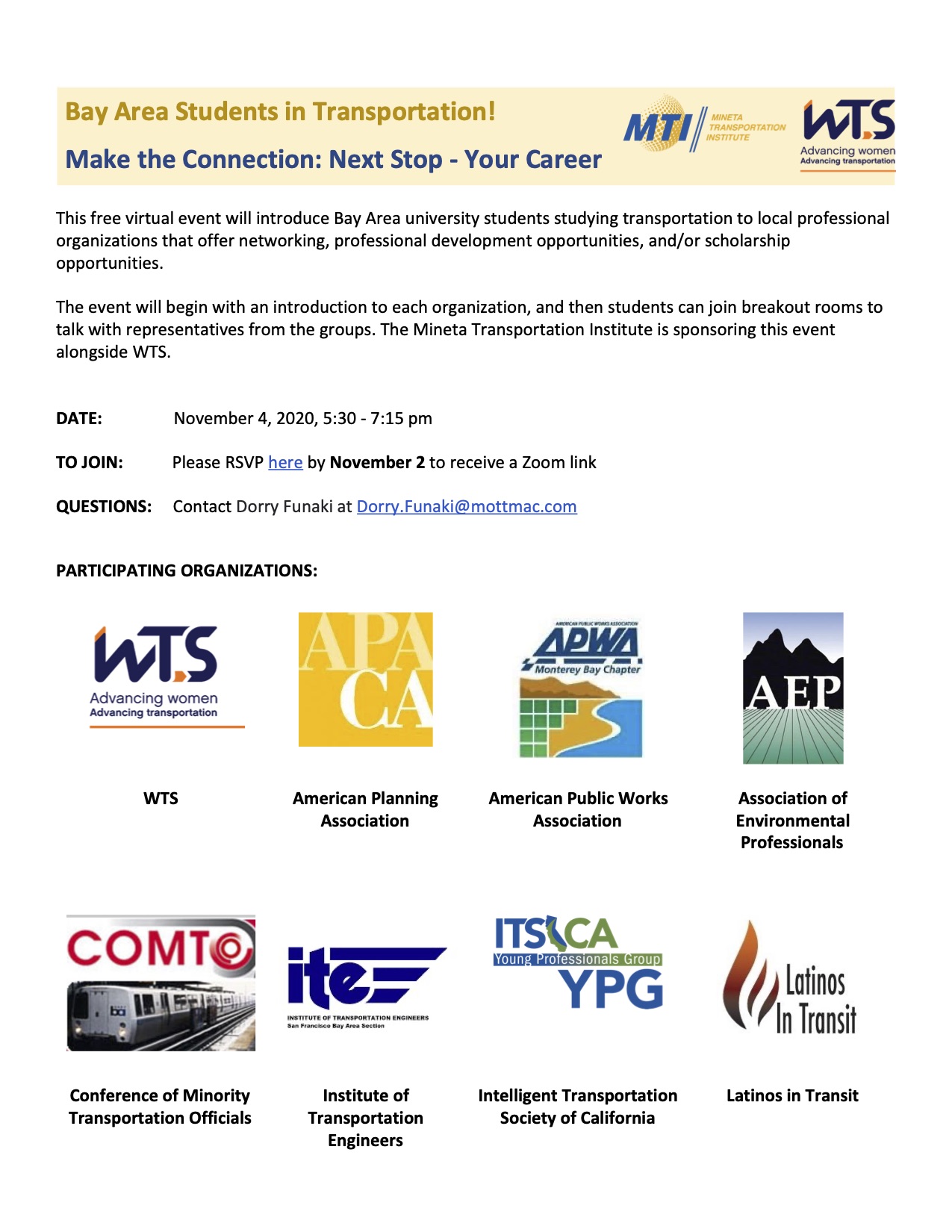 |
Make the Connection: Next Stop Your Career - Online WTS-SF Bay Area and the Mineta Transportation Institute (MTI) of San Jose State University hosted "Make the Connection: Next Stop Your Career." At this event, Bay Area university students studying transportation (all disciplines) were introduced to the many wonderful professional organizations in our region, including:
|
October 29, 2020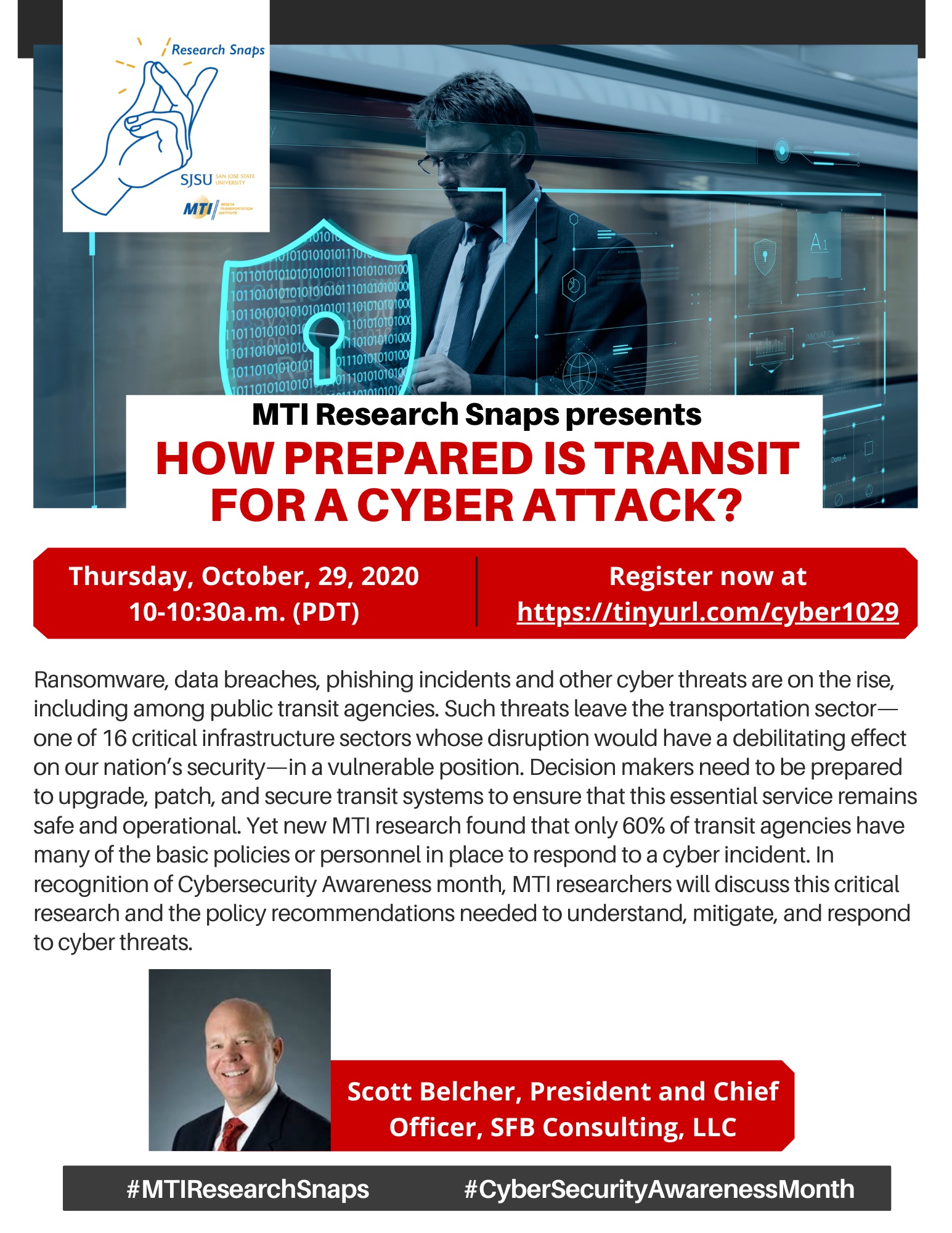 |
MTI Research Snaps Webinar: "How Prepared Is Transit for a Cyber Attack?" - Online Ransomware, data breaches, phishing incidents and other cyber threats are on the rise, including among public transit agencies. Such threats leave the transportation sector—one of 16 critical infrastructure sectors whose disruption would have a debilitating effect on our nation’s security—in a vulnerable position. Decision makers need to be prepared to upgrade, patch, and secure transit systems to ensure that this essential service remains safe and operational. Yet new MTI research found that only 60% of transit agencies have many of the basic policies or personnel in place to respond to a cyber incident. In recognition of Cybersecurity Awareness month, MTI researchers discussed this critical research and the policy recommendations needed to understand, mitigate, and respond to cyber threats. View Recording.View Slides. |
October 19, 2020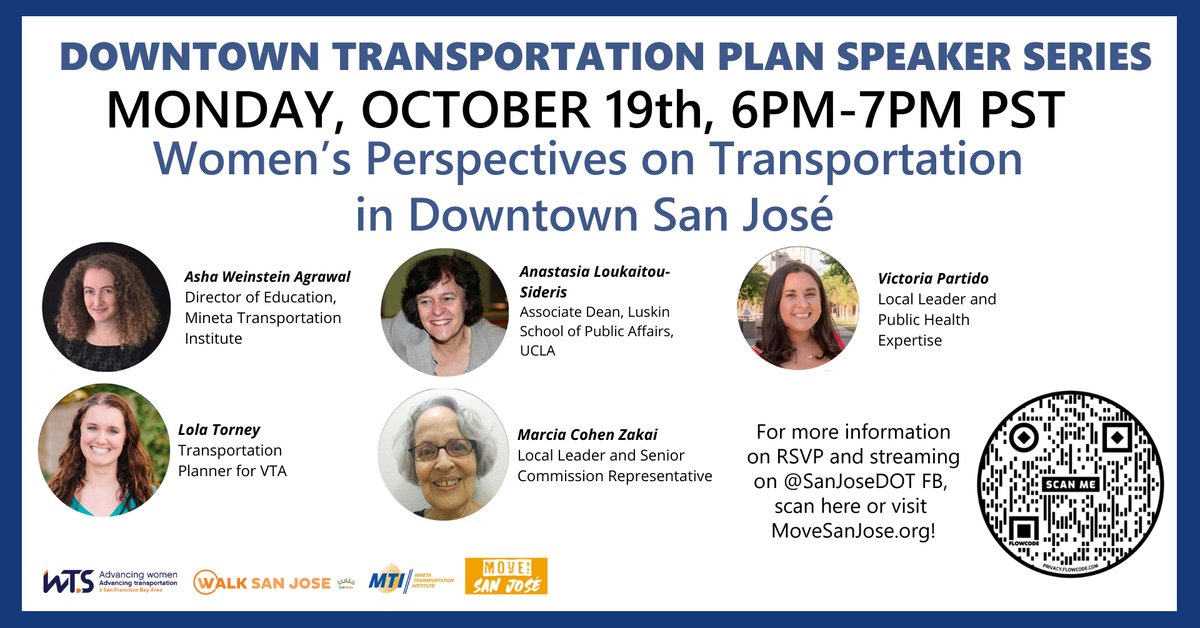 |
Women’s Perspectives on Transportation in Downtown San José Historically, cities have often been planned by and for white men. Studies show that women often have different needs and travel patterns, and different concerns about safety, particularly when walking, biking, and taking transit. Our panel has explored the experience of women traveling within and to downtown San José, how the current transportation options do and do not serve them, and identifed solutions to make our streets safer in order to create a transportation system that truly serves everyone. WTS for the Downtown Transportation Plan Speaker Series focused on Women’s Perspectives on Transportation in Downtown San José. These are engaging conversations with San José community leaders and thought partners that are sparking innovative thinking around the future of San Jose’s downtown transportation. Understanding how women travel in San José and in the Downtown area will be key to building a transportation system that works for everyone. This panel brought together experts in the transportation field in conversation with local community members:
|
October 7, 2020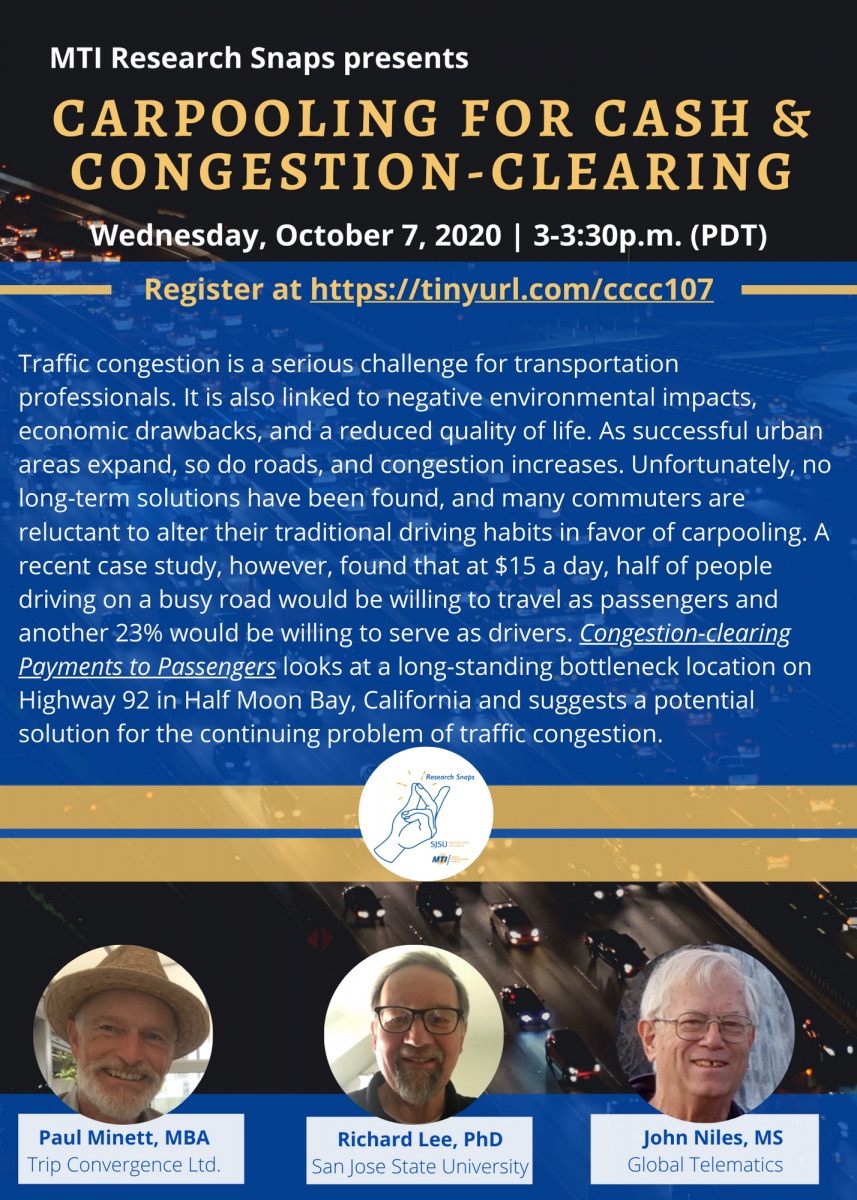 |
MTI Research Snaps Webinar: "Carpooling for Cash and Congestion-clearing" - Online Traffic congestion is a serious challenge for transportation professionals. It is also linked to negative environmental impacts, economic drawbacks, and a reduced quality of life. As successful urban areas expand, so do roads, and congestion increases. Unfortunately, no long-term solutions have been found, and many commuters are reluctant to alter their traditional driving habits in favor of carpooling. A recent case study, however, found that at $15 a day, half of people driving on a busy road would be willing to travel as passengers and another 23% would be willing to serve as drivers. Congestion-clearing Payments to Passengers looks at a long-standing bottleneck location on Highway 92 in Half Moon Bay, California and suggests a potential solution for the continuing problem of traffic congestion. View Recording.View Slides. |
|
September 24, 2020 |
Surveying Silicon Valley Cyclists - Online Silicon Valley is committed to California’s goal of reducing vehicle miles traveled (VMT) by 15% in the next three decades. To investigate local support for this initiative, MTI researchers—in collaboration with Silicon Valley Bicycle Coalition (SVBC) and the Santa Clara Department of Public Health—surveyed 1,009 Santa Clara County residents, recruited via location-based targeted advertisements, about their travel behavior and attitudes. This webinar based on the report, Surveying Silicon Valley Cycling, Travel Behavior, and Travel Attitudes, discussed survey findings on a range of transportation modes (driving, public transportation, walking, and more), with an emphasis on cycling. |
September 17, 2020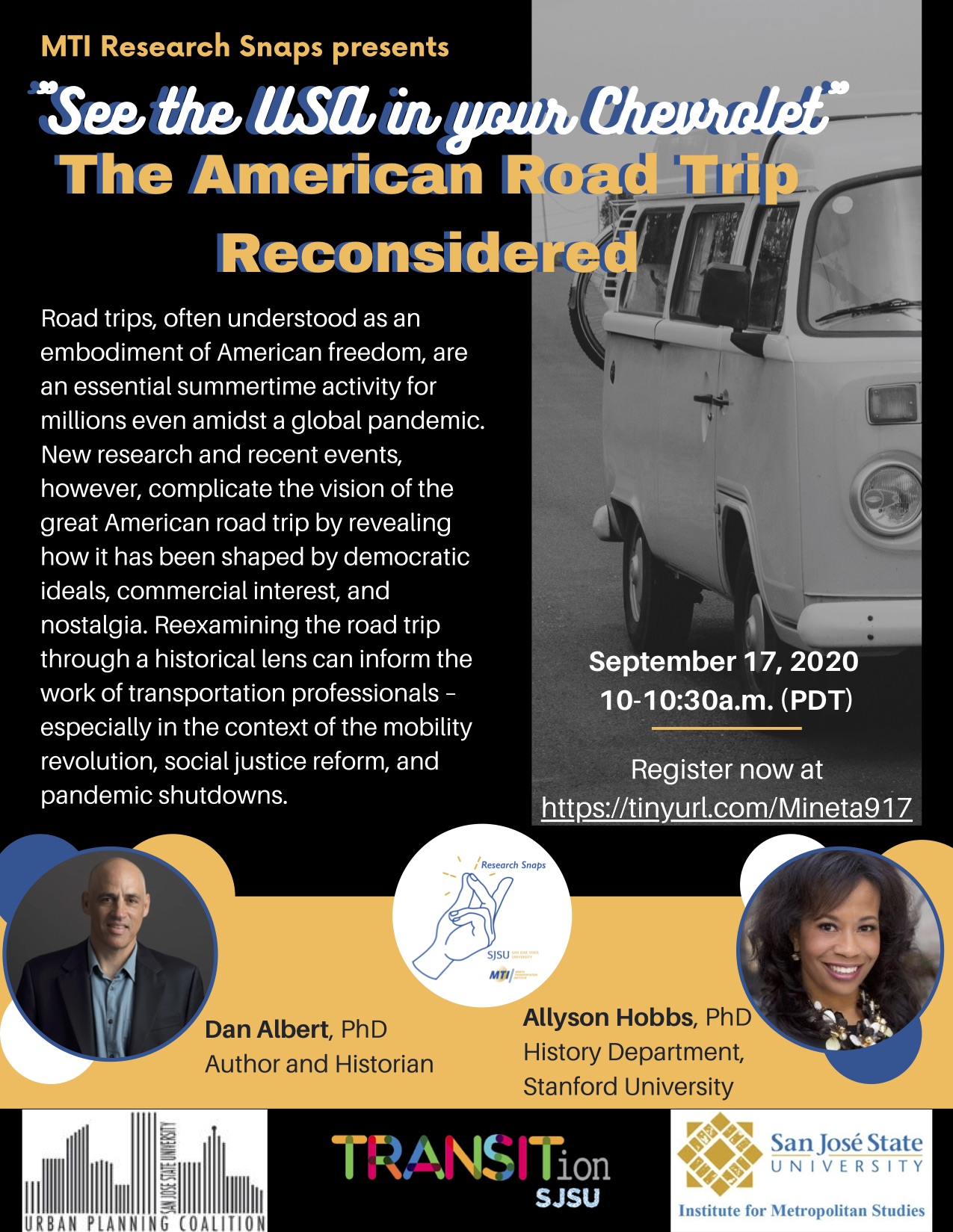 |
MTI Research Snaps Webinar: "See the USA in Your Chevrolet: The American Road Trip Reconsidered" - Online Road trips, often understood as an embodiment of American freedom, are an essential summertime activity for millions even amidst a global pandemic. New research and recent events, however, complicate the vision of the great American road trip by revealing how it has been shaped by democratic ideals, commercial interest, and nostalgia. Reexamining the road trip through a historical lens can inform the work of transportation professionals – especially in the context of the mobility revolution, social justice reform, and pandemic shutdowns. View Recording.View Slides. |
August 25, 2020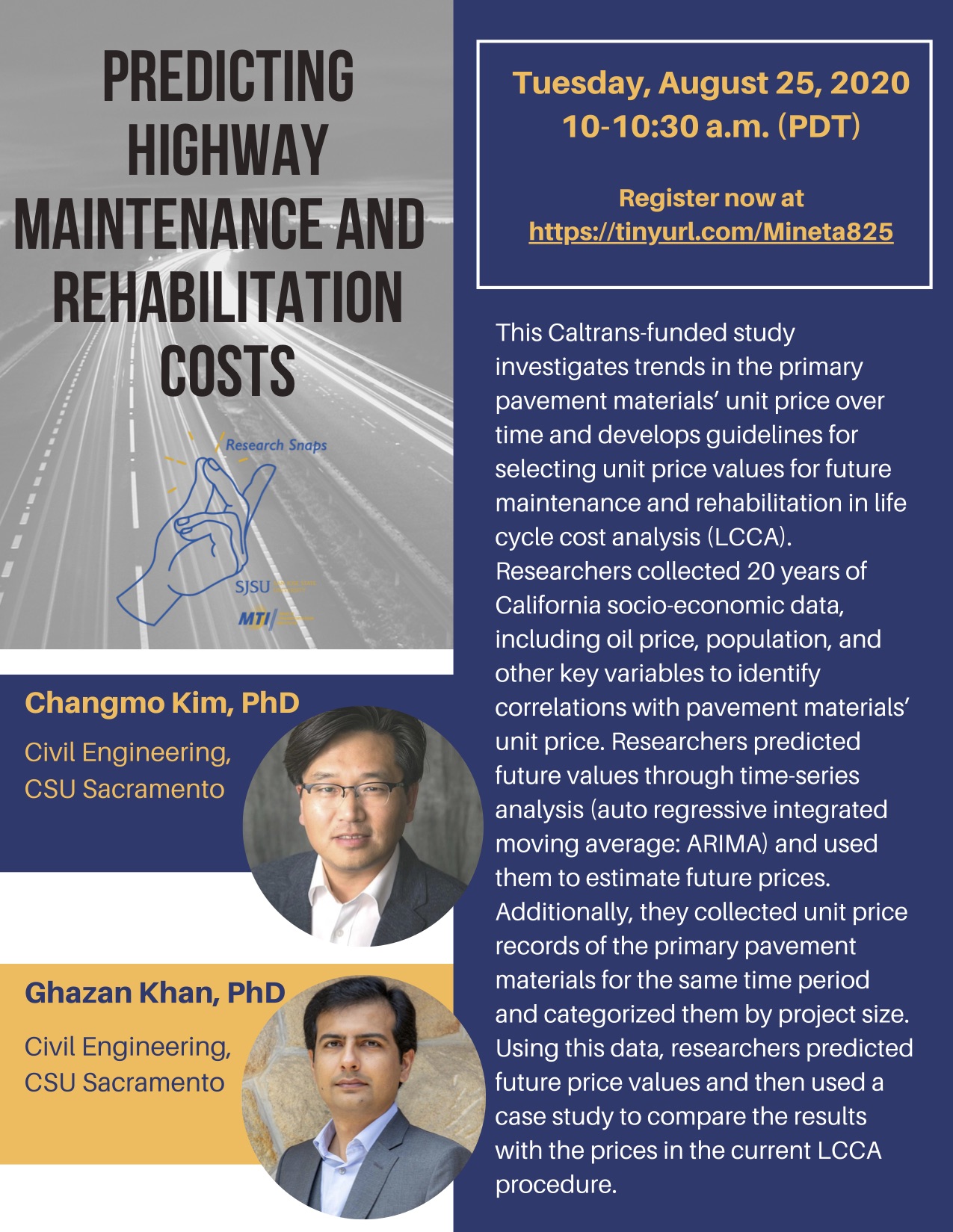 |
MTI Research Snaps Webinar: "Predicting Future Highway Maintenance and Rehabilitation Costs" - Online This webinar discussed the Caltrans-funded study investigating trends in the primary pavement materials’ unit price over time and developed guidelines for selecting unit price values for future maintenance and rehabilitation in life cycle cost analysis (LCCA). Researchers collected 20 years of California socio-economic data, including oil price, population, and other key variables to identify correlations with pavement materials’ unit price. Researchers predicted future values through time-series analysis (auto regressive integrated moving average: ARIMA) and used them to estimate future prices. Additionally, they collected unit price records of the primary pavement materials for the same time period and categorized them by project size. Using this data, researchers predicted future price values and then used a case study to compare the results with the prices in the current LCCA procedure. View Recording.View Slides. |
August 20, 2020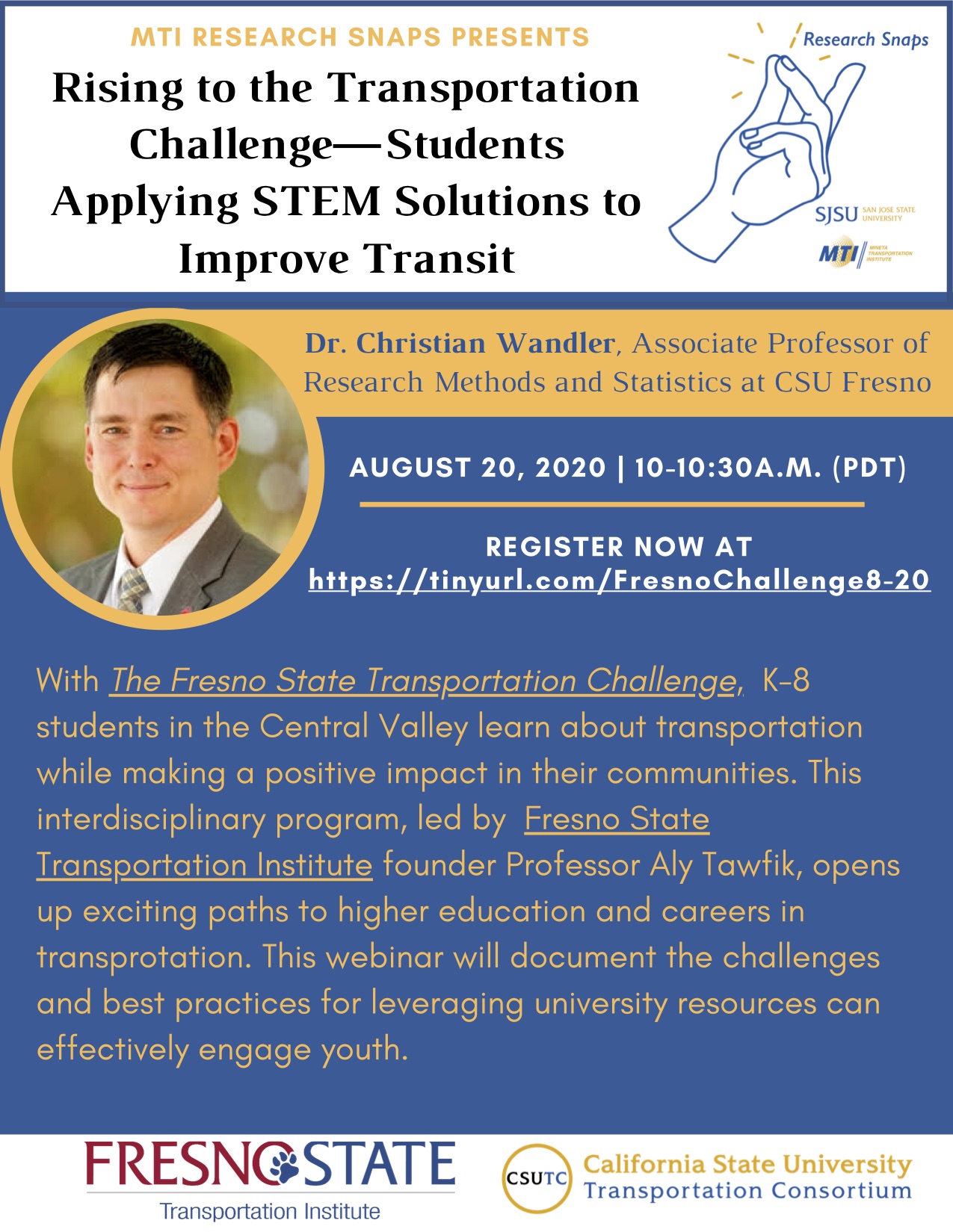 |
MTI Research Snaps Webinar: "Rising to the Transportation Challenge—Students Applying STEM Solutions to Improve Transit" - Online With the Fresno State Transportation Challenge, K-8 students in the Central Valley learn about transportation while making a positive impact in their communities. This interdisciplinary program, led by Fresno State Transportation Institute founder Professor Aly Tawfik, opens up exciting paths to careers in transportation. This webinar documented the challenges and best practices for leveraging university resources to effectively engage youth. View Recording.View Slides. |
July 30, 2020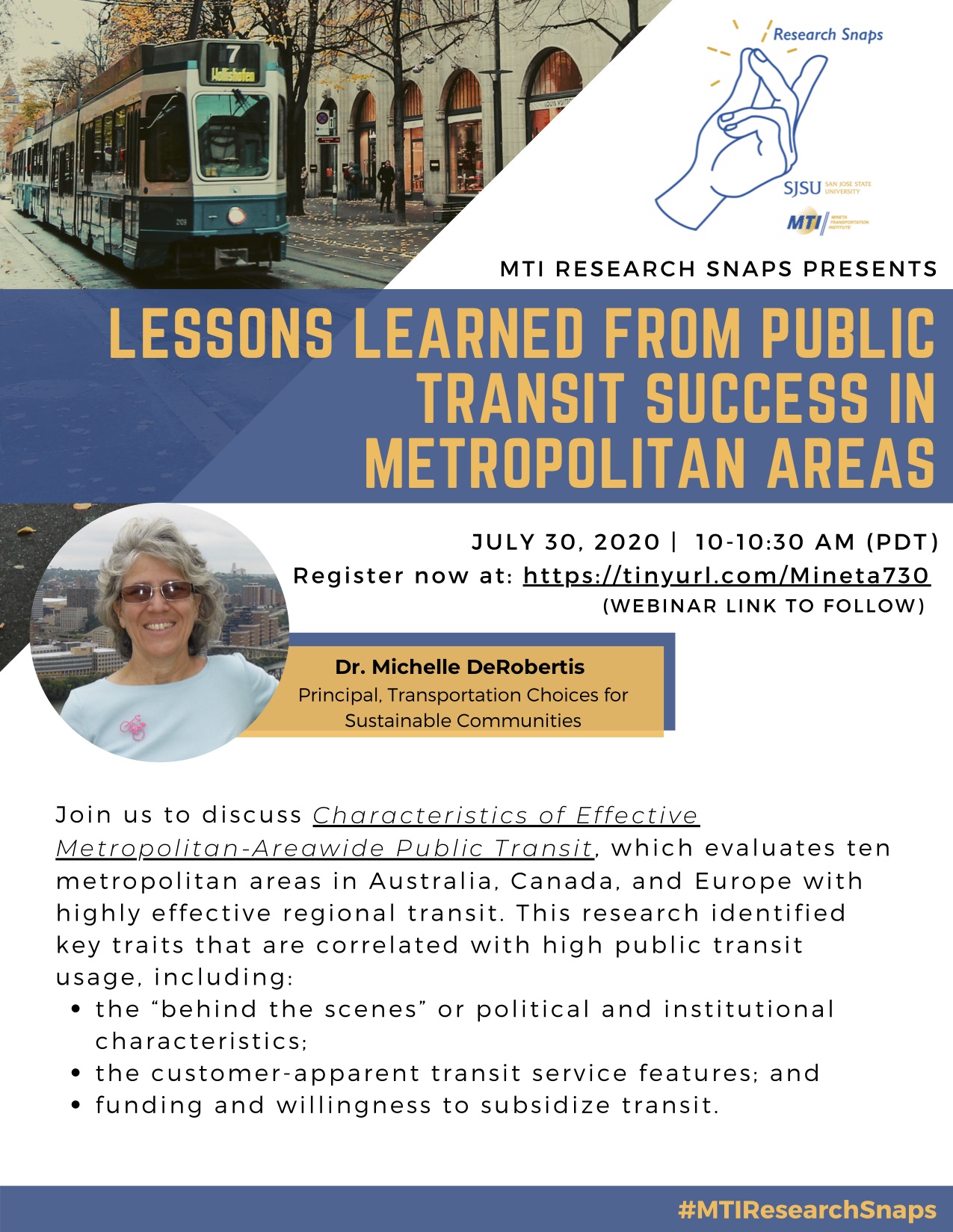 |
MTI Research Snaps Webinar: "Lessons Learned From Public Transit Success in Metropolitan Areas" This research webinar covered research from Characteristics of Effective Metropolitan-Areawide Public Transit, which evaluates ten metropolitan areas in Australia, Canada, and Europe with highly effective regional transit. This research identified key traits that are correlated with high public transit usage, including:
View Recording.View Slides. |
Pages
-
Contact Us
San José State University One Washington Square, San Jose, CA 95192 Phone: 408-924-7560 Email: mineta-institute@sjsu.edu





